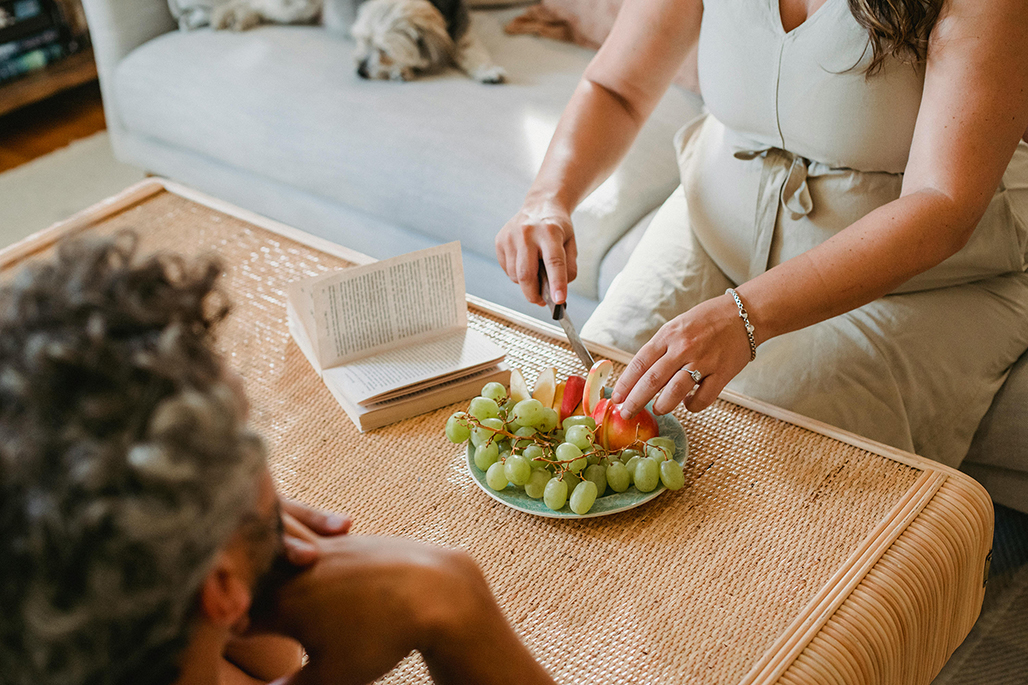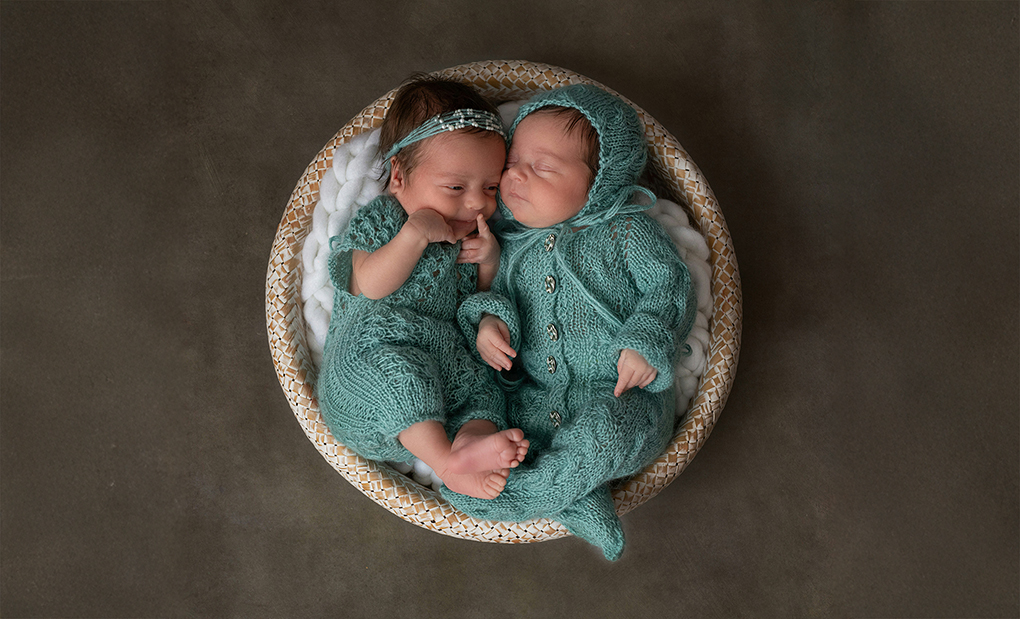Meet 29-year-old parents – Shaun and Denise – managing life with their identical twin girls, Eliza and Leia.
Both parents work in eldercare and interact with seniors who have various needs. They enjoy spending time together as a family with their 18-month-old twins and have agreed to share their story with us despite being introverts. We hope their journey inspires and uplifts you!

When did you first find out that you were expecting twins, and what was your initial reaction?
We initially visited a private gynae clinic a week after experiencing morning sickness, where the doctor confirmed our pregnancy.
At that time, we identified only one sac measuring at 6 weeks.
Due to Denise's congenital heart disease, we had to consult her cardiologist regarding potential complications. During this visit, the junior gynae confirmed that we were 12 weeks pregnant with MCDA twins. The moment the doctors informed us about expecting twins, we were both quite taken aback. We were definitely not expecting to be first-time twin parents.
Can you share your experience with prenatal care during the twin pregnancy? Were there any special considerations or medical interventions involved?
Denise was suffering from extreme morning sickness that lasted until her third trimester. Thankfully, medical intervention was not required.
How did your healthcare team support you throughout the pregnancy, considering it was a twin pregnancy?
We were in the care of CHiRP – Centre for High Risk Pregnancy at Singapore General Hospital.
As they were MCDA, we were told that there would be a possibility of them developing Twin-to-Twin Transfusion Syndrome (TTTS). Due to Denise’s pre-existing condition, the twins would have a greater risk of developing heart abnormalities. We had appointments every 2 weeks to ensure that the twins were growing healthily.
How and when were your twins delivered? Were there any unexpected developments or challenges during the labour and delivery process?
Denise underwent an emergency caesarean section to deliver the twins.
During our routine checkup at 34 weeks, we discovered that Denise's blood pressure was dangerously high, requiring immediate admission for preeclampsia. The decision was made for her to undergo an emergency c-section the following morning. A twist in the delivery process unfolded as we learned that I (the husband) couldn't enter the operating theatre just as she was about to be wheeled out of the suite. Tears were shed, goodbyes were said, but thankfully, all three are now well and thriving.
Did your twins require any special treatment after delivery?
Leia, the younger twin, was born at 1.7kg, too small for the BCG and Hepatitis B vaccinations usually given within 24 hours of birth in Singapore. Additionally, her lungs were not functioning at 100%, necessitating oxygen and admission to the Neonatal Intensive Care Unit (NICU). Despite it being just a day, it was nerve-wracking to watch our hour-old child undergo examinations, handled by doctors and nurses, and having an x-ray taken in the NICU. Both twins required IV drip and tube feeding for several weeks. In total, the girls spent a month in the Neonatal High Dependency ward.



How was it like to finally bring the two of them home?
Relief, naturally, that they were finally well, but also some trepidation as now we have to navigate parenthood alone. Changing diapers, bathing, feeding every 2 hours, and losing a lot of sleep became our new routine.
Were there any surprises or challenges that stood out during the first few weeks at home with your twins?
I guess no first-time parent could ever be prepared for that first time you are woken up by a cry in the middle of the night. The shock of that sound, followed by "Oh yea, I have a kid now" and finally jumping out of bed to get milk before the other twin is awoken is really an experience we will never forget.

How did your family and friends contribute to your journey as parents of twins, both during pregnancy and after the birth?
Both our mothers were around very often to aid Denise in postpartum recovery. Good food, lots of bed rest, and the 4 weeks when the kids were away allowed her to recover. Once I returned to work, a weekday schedule for our mothers during Denise's maternity leave eased the transition. Many friends would pop by bearing gifts of fruits, diapers and milk powder too. We are very thankful that many of our close friends were and are still willing to visit us and bless our family.
Thanks for sharing your pregnancy experience and birth story with us! Let’s move onto something else now – we are huge fans of Leia and Eliza’s mukbang! Can you please tell us about your approach to weaning?
So, on our Instagram, you’ll see that we are huge advocates of baby led weaning. Solid Starts has excellent materials and visuals to assist with this. We knew the mess would be many times worse than if we fed them ourselves but we wanted to train our girls to be independent. On top of that, premature children tend to have swallowing, eating and speech impairments.
Baby led weaning, hopefully, would be a good start to mitigate or alleviate some of these eating issues that the kids may face in the future. We also wanted to let our kids have the option to try as many foods as possible when they are young. Allowing our kids to try various foods early helps acclimate them to potential allergens, and most importantly, to prevent them from being a picky eater like me (their Daddy).

Managing baby-led weaning with one child can be a unique experience, but how did you adapt the process to accommodate the needs and dynamics of having twins?
At the start it was hard, they'd get everything, even each other, covered in food. Halfway through the meal, they'd try to eat the food on each other's faces.
We aimed to give both of them the same food and the same number of items so that it's all fair. After a while, they learnt to offer food to each other and share their snacks.
Each twin is different. On some days, Eliza would be pickier and Leia would eat all the food and vice versa. Flexibility on our part plays a huge role too, as much as we want them to eat the same amount and hope they’d finish their food, we don't want them to develop averse feelings towards eating and do give in occasionally.
Were there any specific challenges or successes in introducing solids to both babies simultaneously?
No particular challenges come to mind. As long as the food sizes are age appropriate, we find that baby led weaning is very safe. All the relevant information can be found online easily. We just have to keep an eye out for choking occurrences for 2 kids instead of 1, and of course, tackle double the cleaning. Every new food the children enjoy is a success. It's extremely enjoyable to watch the kids learn how to gnaw on vegetable sticks, eat a cob of corn or simply slurping up noodles on their own.
Last question! What are your favourite and least liked parts about parenting so far?
My favourite would be documenting how the kids grow.
Remember, your child is only this young once.
It is very surprising to go back and see that just a few months ago, the children were barely crawling and now we’ve got to chase them everywhere.
My least favourite would be that there is very much less time spent as Husband and Wife as most of it now is taken up as being a Father and a Mother. Both roles are vital in making the marriage work. There will be good days and bad days for both parents. We chose to spend our lives together and have a family so we'd have to make things work, be it by communicating more, sitting down and having an earnest conversation or simply stepping up when your spouse needs you to. Making an effort to spend time as Husband and Wife allows us to align ourselves to why we chose to be parents together and reconfirm our goals as a couple and as parents.
–––
Heartfelt thanks to Shaun and Denise for sharing their experiences with us! Whether you’re a parent expecting twins or triplets, or contemplating if baby led weaning is worth the mess, we hope this interview benefits you.
Wish to be featured or have any tips to share with our community? Drop us a note here!
All content from this website, including images, cannot be reproduced without credits or written permission from Multiples Matter.








